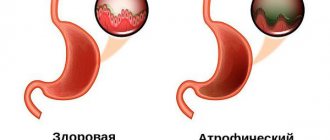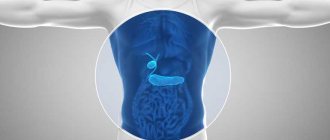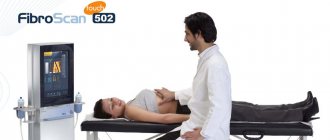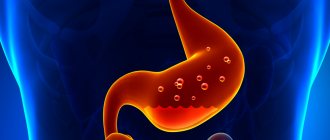Gastroenterologist
Neronov
Vladimir Alexandrovich
24 years of experience
Gastroenterologist, Doctor of Medical Sciences
Make an appointment
Gastritis is an inflammatory disease of the stomach, during which the mucous membrane is affected due to the influence of various factors. Gastritis of the stomach belongs to the category of common diseases that currently occur not only in adults, but also in children (superficial gastritis). Adult gastritis of the stomach is more common in middle-aged and elderly people.
Experts identify the following forms of the disease:
- acute form, which occurs suddenly against the background of irritants;
- a chronic form that occurs over time due to improper lifestyle and diet.
Depending on many factors, erosive gastritis, biliary, hypertrophic or peaty gastritis can be diagnosed. Acute forms of the disease are divided into purulent, necrotic, diphtheric, and simple. Depending on the acidity of the stomach during gastritis, the following are distinguished:
- gastritis with high acidity;
- gastritis with low acidity.
Symptoms and signs of gastritis
They help identify gastritis symptoms depending on the type of disease:
- acute gastritis begins suddenly, often after food poisoning; sharp pain with gastritis is felt in the solar plexus area. The pain may intensify when taking foods that irritate the gastric mucosa. The main symptoms of gastritis of the stomach: heartburn, vomiting, belching, frequent release of gas, bloating, headache, rapid heartbeat, dizziness, increased salivation or extreme thirst;
- Chronic gastritis is sluggish. If chronic gastritis is diagnosed, the symptoms in adults may vary, but generally this pathology is characterized by belching with a characteristic odor, constant heartburn, a feeling of pain and heaviness, loss of appetite, diarrhea or constipation, coating on the tongue, and weight loss. Due to the fact that the signs of gastritis of the stomach depend on the type of pathology, only a doctor can make an accurate diagnosis. In the chronic form, nutrition plays an important role in gastritis.
Depending on the form and type of gastritis, symptoms and treatment vary significantly, so the best solution for the patient is to immediately consult a doctor.
Are you experiencing symptoms of gastritis?
Only a doctor can accurately diagnose the disease. Don't delay your consultation - call
Dietary food for gastritis
Since it is virtually impossible to treat acute forms of gastritis without adjusting the diet, on the first day patients are only advised to drink plenty of fluids. It is advisable to drink mineral medicinal table waters without gas. After the condition improves, it is recommended to follow a gentle diet. Preference is given to slimy soups and porridges, jelly and various purees. Such dishes have an enveloping effect and protect the mucous membrane from re-injury.
In acute inflammation, the diet in the first week corresponds to dietary table No. 1. In chronic disease, the diet depends on the morphology of inflammation and the type of gastritis.
In case of hyperacid gastritis, foods that cause an increase in the secretion of hydrochloric acid are excluded from the menu: a variety of spices, fatty foods, carbonated and strong drinks, broths and mushrooms.
The general principles of nutrition for this type of disease correspond to dietary table No. 1. Food is taken up to 6 times a day in small portions. The temperature of the dishes is average. Stop eating 3-4 hours before bedtime.
For anacid gastritis, food corresponds to dietary table No. 2. The diet is enriched with natural products that stimulate the secretion of gastric juice:
- soups with meat or fish broth;
- spicy herbs (dill, parsley);
- vegetables;
- cereals (for side dishes and porridges);
- fruits and berries;
- juices, warm tea.
If there is severe discomfort in the intestines, it is recommended to reduce the consumption of cabbage, apples and other foods that cause gas formation.
Since inflammation of the mucous membranes of the stomach is not cured in one week, to completely eliminate problems with the organ, the diet is followed throughout the entire period of therapy, as well as after its completion for 2 months. This period is necessary for complete restoration of mucosal tissue. If the patient is diagnosed with a chronic process, it is recommended to follow the diet throughout his life.
Causes
Gastritis of the stomach occurs and develops for a variety of reasons, the main ones being non-microbial and bacterial factors. Experts call the main cause of the disease the bacterium Helicobacter pylori, detected in 80% of cases, fungi and other bacteria. When bacteria enter the mucous membrane, they release substances that lead to the onset of the inflammatory process.
Other causes of pathology include:
- unhealthy diet: incorrect eating regimen, incorrectly selected diet, frequent consumption of spicy, fatty, refined foods, lack of plant fiber;
- excessive alcohol consumption;
- uncontrolled use of medications, including non-hormonal anti-inflammatory drugs;
- infection of the body with worms;
- frequent stressful situations;
- allergic reactions to foods and substances;
- metabolic disease.
Gastritis can also appear in adults due to excessive physical and emotional stress. One of the conditions for recovery is following the menu prescribed by the doctor for gastritis.
Types of damage to the mucous membrane
Gastritis can also be classified according to the degree of change in the gastric mucosa. The mildest form is superficial, when the inflammatory process affects only the upper part of the mucosa. More dangerous forms include the following:
Although hyperplastic gastritis is characterized by the appearance of neoplasms, they are predominantly benign.
The atrophic form often leads to stomach cancer. Each of these types can be focal or diffuse: the first covers a small area of the mucous membrane (although there may be several of them), the second spreads over its entire surface.
Complications
The main cause of complications is the chronic form of the disease. If signs of chronic gastritis appear, but the patient does not consult a doctor, the following complications may occur:
- anemia;
- atrophic gastritis;
- leptic ulcers;
- benign or malignant tumors on the mucosa.
The only way to restore health is to promptly consult a qualified doctor who will give recommendations on how to treat gastritis. Taking pills for gastritis on your own is not recommended, so as not to provoke an exacerbation of the disease and its transition to a severe form. The likelihood of complications depends on what patients with chronic gastritis eat.
How to give first aid at home
De-Nol is a drug for gastritis.
With the exception of the not-so-pleasant symptoms listed above, attacks of acute gastritis are characterized by an increase in one or all symptoms at once. To alleviate a person’s condition, it is necessary to call a doctor and provide first aid to the patient before his arrival.
It is necessary to put the patient to bed. Fill a heating pad with hot water and place it on the area of pain – this will relieve the pain a little. Give warm water or warm, but not hot tea to drink.
If there are special medications that relieve stomach pain and gently coat the walls of the stomach, then they should be given to the patient according to the instructions. Such drugs are, for example, Maalox or De-Nol.
In case of urgent need, rinse the patient’s stomach. Baking soda dissolved in plenty of water works well for this. If your stool is upset, you should use a laxative or give an enema. Even if after first aid the discomfort subsides and the patient feels much better, a doctor should still be called.
When to see a doctor
You should consult a doctor if you feel severe pain with gastritis of the stomach, since exacerbation of gastritis can cause a serious deterioration in health with an increase in the area of mucosal damage and transition to an ulcerative state. Gastritis is especially dangerous if there is increased acidity, since the juice tends to corrode the mucous membrane of the organ, resulting in the formation of ulcers. If, based on a number of signs, the patient has identified an exacerbation of gastritis, the symptoms of which are nausea to vomiting, complete loss of appetite, fever up to 39 degrees Celsius and severe pain, you should make an appointment with a specialist as quickly as possible.
Gastritis, the symptoms and treatment of which may vary in adults, is diagnosed by a gastroenterologist. The Center for Modern Medicine JSC "Medicine" (academician Roitberg's clinic) in Moscow offers diagnostic and treatment services for all types of gastritis using modern medical devices and drugs. More complete information on the topic “gastritis and its treatment in adults” can be obtained by clicking on the link. Our clinic is located at 2nd Tverskoy-Yamskaya Lane, building 10, a 5-minute walk from the Mayakovskaya metro station.
How to help children
Poor diet in children can cause gastritis.
Despite the fact that the principles of first aid for an acute attack of gastritis are the same for everyone, when treating children, measures should be relaxed a little. Gastritis in children most often manifests itself at school age, when parental control over nutrition and daily routine becomes weaker.
The causes of gastritis in children are still the same - poor diet, intolerance and allergic reactions to certain foods, infections that cause intoxication. The problem of diagnosing gastritis in young children is the impossibility of determining the cause of the painful condition based on symptoms - to be sure, a conclusion from a gastroenterologist and an analysis for salmonellosis are necessary.
If a child exhibits the same symptoms as an adult, you should immediately call a doctor at home and try to provide first aid yourself. However, the assistance provided to the child has its own characteristics:
- Gastric lavage is done with a solution of 0.5% baking soda, non-carbonated mineral or clean boiled water.
- A heating pad with warm water is placed on the epigastric region, and a warm compress is placed on the stomach.
- The child is advised to drink plenty of warm water, however, feeding him during an attack is strictly prohibited, as this can only aggravate the situation.
- In case of severe pain, you should give an antispasmodic agent - no-shpa (dosage according to instructions) or belladonna tincture (5-10 drops).
- Bed rest after an attack must be observed for 2-3 days, but you can only fast for the first 8-12 hours after the condition worsens.
A child can be hospitalized only in case of a sharp deterioration in the condition - incessant vomiting or severe dehydration. If there is a large loss of fluid, it is urgently necessary to replace it intravenously.
Treatment
When gastritis is diagnosed, treatment and medications are prescribed by a specialist, taking into account the course of the disease and the patient’s condition. A gastroenterologist selects a medicine for gastritis based on the examination results strictly individually. A prerequisite for recovery is a properly selected diet for gastritis; the menu for patients is developed by the doctor, taking into account the age and condition of the patient, and lifestyle. During the consultation, the doctor will tell you in detail about what you can eat with gastritis and what you cannot eat with gastritis.
What methods are used to treat gastritis?
Methods for eliminating gastritis depend on many factors. Since gastroenterologists advise treating not only the manifestations of the disease, but also the disorders that caused it, the treatment plan is drawn up by the gastroenterologist together with other specialists.
The basis of therapy is medications:
- antibiotics (tetracycline, amoxicillin, metronidazole) are prescribed for infectious, bacterial and purulent inflammation of the mucous membranes;
- enterosorbents (activated carbon, etc.) are prescribed for chemical, infectious, medicinal, and catarrhal gastritis;
- antacids (Almagel, Phosphalugel and others) are prescribed for hyperacid gastritis;
- gastric juice substitutes and drugs that increase the secretion of hydrochloric acid (Acidinpepsin, Betacid, Pepsidil, Abomin) are prescribed for anacid gastritis;
- in case of insufficient or inadequate peristalsis, the drug Cerucal is prescribed.
To eliminate symptoms, antispasmodics (Noshpa, Drotaverine, Halidor, Papaverine hydrochloride) and multienzyme agents (Pancreatin, Digestal, Festal, Mezim) are prescribed.
For severe vomiting, a gastroenterologist may prescribe antiemetics. Treatment is not complete without auxiliary medications: cytoprotectors (Venter, Antepsin, Denol), steroid drugs (Nerobol, Retabolil) and drugs that improve trophic processes (Methyluracil, Pentoxyl). Proton pump inhibitors and drugs that improve the functional state of the digestive tract are also used to treat the disease.
How to make an appointment with a gastroenterologist
You can make an appointment with a gastroenterologist at our multidisciplinary medical center at 2nd Tverskoy-Yamskaya Lane, building 10 in the following ways:
- use the form on the website;
- use the phone +7 (495) 775-73-60 around the clock.
JSC "Medicine" (clinic of academician Roitberg) also offers services to call a gastroenterologist at home and by phone +7 (495) 775-73-60 around the clock.
JSC "Medicine" (clinic of academician Roitberg) is located a 5-minute walk from the "Mayakovskaya" metro station.
How is acidity level determined?
The main acid found in the stomach and determining its acidity level is hydrochloric acid. It is produced by parietal cells. The alkaline components of gastric juice neutralize hydrochloric acid. They are produced by accessory cells of the mucosa. The two substances interact and the acidity level changes throughout the day.
You can find out its level using intragastric pH-metry. To do this, a thin probe with a measuring electrode is placed into the patient's stomach. It gradually moves deeper and shows the pH in different areas of the organ.
In the part of the stomach where acid is produced, in an adult patient the pH should be from 1.6 to 2.0, and in the zone of alkali production and acid quenching - up to 5.2.
The doctor also pays attention to the symptoms. With high acidity, the patient suffers from heartburn, belching and a burning sensation in the throat; with low acidity, the patient suffers from bloating, flatulence and bad breath.
Dopamine receptor blockers and electrolyte solutions
Regidron is a drug for the treatment of gastritis.
Gastritis is often accompanied by nausea, vomiting and epigastric pain. Sometimes diarrhea develops. To relieve dehydration and remove beneficial microelements, taking electrolyte solutions is indicated.
Usually, rehydron or dextrose solution is prescribed. The drugs are administered orally for mild to moderate gastritis, and intravenously for severe inflammation.
Dopamine receptor blockers are used to eliminate the symptoms of dyspepsia - nausea and vomiting.
Traditionally, cerucal, metoclopramide, and egronil are prescribed. These drugs improve the motor activity of the gastrointestinal tract and prevent the backflow of intestinal contents into the stomach cavity.
Useful tips
In order not to worry about possible death as a result of gastritis, you need to follow a few simple rules. They are simple and will not require much effort from you. This is a normal process of taking care of your health.
- Don't panic or escalate the situation. It has been proven that stress, panic and depression have a negative impact on almost all types of diseases. If you always worry, worry and fear, the situation will only get worse. Gastritis is not the most dangerous diagnosis with which millions of people live without experiencing any major problems leading a normal life.
- Get a full examination. You need to get tested, check your stomach using FGDS and give samples of tissue and gastric juice for study. Based on these data, the doctor will make an accurate diagnosis. Based on this, it is much easier to create a therapy program.
- Eat right. Proper, healthy and balanced food is the basis for a normal life with gastritis. Most people live on medications, taking doses of drugs every day. This is not necessary for gastritis. Sometimes it is enough just to provide the body with suitable food, not to provoke irritation of the mucous membrane and consume foods that allow you to restore damaged stomach tissue.
- Get rid of bad habits. This is one of the main problems why a person with ordinary gastritis eventually develops more dangerous diseases. Bad habits quickly destroy the stomach, which is why other diseases, including deadly ones, arise against the background of gastritis. Although for many, this point is the hardest to fulfill. But this must be done.
- Periodic prevention. Having agreed on your actions with your doctor, you can take a course of medications for the gastrointestinal tract once a year, take tests and come back for examinations. This will take a little of your time, but will eliminate the risks of complications and prevent a number of diseases in time.
In theory, death from gastritis can occur. But in practice such cases are extremely rare. The main cause of death is not gastritis itself, but the consequences that result from ignoring the problem and lack of adequate therapy.
Be healthy! Don't forget to leave comments, subscribe and tell your friends about us!
Gastal
"Gastal" are lozenges, so they are always convenient to have on hand and do not need to be washed down with water. It contains magnesium and aluminum, which instantly “quench” heartburn, and the positive effect lasts for about two hours after the tablet is dissolved. "Gastal" not only reduces acidity, but also helps the gastric mucosa to recover. The drug is prescribed in the complex treatment of gastritis and ulcers.
The course of treatment with Gastal is selected by the doctor; you can also use the drug as a one-time “first aid” to relieve the symptoms of heartburn. You can take no more than 8 Gastal tablets per day. It is important that side effects from taking this medication are very rare.
Gastal
TEVA, Ukraine
The combined drug Gastal contains aluminum hydroxide, magnesium carbonate and magnesium oxide.
The combination of active ingredients provides a high antacid (reducing stomach acidity) effect and reducing the possibility of constipation. from 100
1102
- Like
- Write a review
Read also: Top 5 best sorbents for poisoning Rating of the most effective and safe sorbents that help with poisoning and hangover syndrome.
Top 10 rating according to KP
In the treatment of gastritis, various medications with different spectrums of action are used. Doctors often prescribe several drugs at once, aimed at different mechanisms of inflammation. We will discuss the most prescribed medications for gastritis.
Sea buckthorn oil
Sea buckthorn oil. Manufacturer: Altaivitamins
Of the natural preparations that are effective for gastritis, ulcers and as part of the restoration of the gastrointestinal tract after operations, sea buckthorn oil in capsules is used. It stimulates the healing of the mucous membrane and has a general strengthening effect.
Due to its natural composition, it has a limited list of contraindications. Children under 12 years of age should not use it and if they are diagnosed with:
- cholecystitis,
- pancreatitis,
- hepatitis.
It is recommended to discuss the dosage and duration of use with your doctor.
show more
Nexium
Nexium
Nexium is one of the drugs that reduces the secretion of aggressive gastric glands during gastritis and peptic ulcers. This drug contains esomeprazole, which is used in the treatment of acid-related gastrointestinal diseases.
Suitable for:
- healing of ulcers;
- eliminating the symptoms of gastritis;
- with reflux disease.
Nexium can be taken by children from one year of age as part of the treatment of gastroesophageal reflux disease. In case of severe renal failure, the drug is used with caution.
Panzinorm
Panzinorm. Manufacturer: KRKA
The drug Panzinorm can be used as part of complex therapy for gastritis with low acidity. The capsules contain Pancreatin, which is why digestion is stabilized when used.
It is used for inflammatory and dystrophic diseases of the gastrointestinal tract in adults and children. During exacerbation of chronic pancreatitis, Panzinorm is not recommended. The effect of the drug is reduced if taken together with antacids (Rennie, Gastal, Almagel, etc.).
Gastrofarm
Gastrofarm. Manufacturer: НBIOVET
Gastrofarm has a protective effect on the mucous membrane of the stomach and intestines due to lactobacilli in its composition. They produce lactic acid, which is involved in the regeneration of the mucosa. Quite often it is prescribed if the patient is taking medications that negatively affect the gastrointestinal tract.
Indicated for use when:
- acute and chronic forms of gastritis;
- stomach and duodenal ulcers.
Release form: tablets that must be chewed or dissolved in water after crushing. Allowed for children over 3 years old. There are no contraindications for use.
show more
Motilium
Motilium. Photo: anssen-Cilag SpA
The drug contains domperidone, which normalizes gastric motility. Motilium is a kind of quick help for the gastrointestinal tract. It is prescribed to relieve the symptoms accompanying chronic gastritis:
- heaviness and discomfort in the stomach;
- nausea and vomiting.
Take the drug in tablet form before meals. Approved for use in the form of a suspension in children over 12 years of age weighing more than 35 kg. During pregnancy and lactation, Motilium is contraindicated, as well as for persons with an allergic reaction to the active substance of the drug. You cannot combine Motilium with Erythromycin and Ketoconazole. In case of chronic heart failure, as well as bleeding from the gastrointestinal tract, you should refrain from taking this drug.
Vikalin
Vikalin. Manufacturer: AVVA RUS
The release form of the drug is coated tablets, sold with a doctor’s prescription. The medicine has a combined effect due to the combination of components of plant origin and bismuth compounds. The drug contains bismuth subnitrate, calamus rhizomes, buckthorn bark, magnesium carbonate, sodium bicarbonate, rutoside. The drug has an antacid (acid-quenching), antispasmodic, astringent and laxative effect. Helps in healing damaged gastric mucosa.
The drug is used:
- for peptic ulcers of the stomach and intestines;
- with hyperacid gastritis;
- for dyspepsia.
Among the contraindications, you should pay attention to the prohibition of use in children under 18 years of age, pregnant and lactating women. You should not take the medicine if you have gastritis with low acidity, kidney failure, enterocolitis, or appendicitis. Side effects include allergies and diarrhea.
Good to know
List of tablets that may be useful for stomach pain
De-Nol
De-nol. Manufacturer: R-Pharm/Ortat
The medicine is produced only in tablet form and is sold with a prescription from a specialist. The drug is classified as a gastroprotective drug, the active ingredient is bismuth citations. When taken orally, the medicine creates a thin protective film on the surface of the stomach. It also has antimicrobial activity against Helicobacter, which causes gastritis and ulcers, has an astringent effect, and an anti-inflammatory effect. Helps protect damaged areas of the mucosa from the aggression of gastric juice.
Indications for use:
- dyspepsia;
- stomach or intestinal ulcer;
- gastritis with increased acidity;
- irritable bowel syndrome.
It is important to take into account possible contraindications to taking the medication - severe kidney damage, pregnancy, and subsequent breastfeeding. Side effects include discomfort in the digestive tract, rashes and headaches.
show more
Ranitidine
Ranitidine. Photo: Stada
The drug is available in the form of regular tablets and injection solutions. Sold by prescription, the main active ingredient is ranitidine. The drug suppresses the activity of the digestive glands in the stomach, blocking the formation of excess volumes of gastric juice and the concentration of acid in it. Helps reduce its formation during the day and night.
Shown:
- with peptic ulcer of the stomach and intestines;
- for gastritis with high acidity;
- heartburn due to gastroesophageal reflux;
- for dyspepsia.
The drug has a number of contraindications for use - sensitivity to the components of the drug, age under 12 years, all trimesters of pregnancy, severe liver damage, kidney failure. Side effects include digestive disorders, general malaise, and headaches.
Omeprazole
Omeprazole.
Manufacturer: OZONE The medicine is available in the form of capsules or solution for injection. Sold by prescription from a doctor. Belongs to a group of drugs that suppress the production of excess acid in the stomach with the active substance omeprazole. By suppressing the proton pump, the synthesis of hydrochloric acid is reduced, which reduces its aggressive effect on the mucous membrane. Indications for use:
- gastritis with increased acidity;
- ulcerative lesions associated with excess acid;
- episodes of gastroesophageal reflux;
- complex therapy for Helicobacter pylori infection.
The drug has a number of contraindications for use - sensitivity to individual components in the product, age under 18 years, pregnancy, lactation. Side effects may include digestive problems, malaise, headaches, and dizziness.
Rennie
Rennie. Manufacturer: Delpharm Gaillard
This product is available in the form of tablets that dissolve slowly in the mouth. It can be bought at a pharmacy without a prescription. The medicine belongs to the category of antacids, that is, it suppresses the activity of hydrochloric acid, which the stomach produces in excess. Due to its active components - calcium carbonate and magnesium carbonate, the medicine binds excess hydrochloric acid, which helps soothe irritated mucous membranes.
The drug is used:
- to eliminate heartburn with gastritis with high acidity;
- with dyspepsia with unpleasant sensations;
- in violation of the diet with irritation of the stomach walls;
- in the complex treatment of ulcers.
Contraindications include allergies to components, serious kidney disease, excess calcium and lack of phosphorus in the blood, urolithiasis, age under 12 years, galactose and lactose intolerance.
show more
How to choose tablets for gastritis
It is important to consult a doctor; only a specialist can make the correct diagnosis and select a drug for the treatment of various forms of gastritis. Therapy varies depending on whether it is an acute or chronic process.
On a note
Gastritis of the stomach: what diet to follow with such a diagnosis
Antibiotics and antibacterial drugs, pyrokinetics and antacids
Antibiotics are medications aimed at suppressing Helicobacter pylori.
Among the antibiotics chosen are broad-spectrum agents - clarithromycin, tetracycline, amoxicillin.
In case of infection by a resistant strain of Helicobacter, medications are selected individually after testing for sensitivity to antibiotics.
This group of drugs is aimed at suppressing Helicobacter. Trichopolum or metronidazole is traditionally used as an antibacterial drug.
If Helicobacter is not detected, and the ulcer is caused by other reasons, then antibiotics are not used for treatment. Pyrokinetics improve the movement of food through the gastrointestinal tract, relieve dyspepsia, heartburn, and a feeling of heaviness in the stomach. Traditionally, cerucal, metoclopramide, and motilium are prescribed. These drugs are not used to treat ulcers on their own.
Antacids are prescribed to relieve heartburn. The choice of these drugs is huge - Maalox, Gastral, Almagel. The course of taking antacids should not exceed 14 days. Additionally, patients are prescribed vitamin complexes, antispasmodics – no-spa, drotaverine, baralgin.
In case of a mild condition, treatment is carried out on an outpatient basis. In severe cases - bleeding, suspected perforation - only in a medical institution.
Is gastritis dangerous?
Doctors and scientific discoveries are the basis and the magic wand, thanks to which gastritis today can be 100% curable, if we talk about acute gastritis, and put it into stable remission - in case of chronic gastritis. But at the same time, gastritis is treated with supportive care and a diet that the patient constantly adheres to.
What if gastritis is not treated? The form becomes more severe and advanced, the area of damage to the stomach becomes larger. As a result, the organ becomes defenseless. Those. Damage to stomach tissue is the first danger of gastritis. Further:
- Peptic ulcer disease. Yes, it is treatable (especially if you trust specialists - for example, doctors at the ACMD-MEDOX clinic), but it is more difficult than in the first stage. And there is no talk of a 100% result that a person will be cured.
- Perforation of the stomach - a through effect occurs in its walls or duodenum, which threatens the leakage of contents. Where? Into the abdominal cavity. Perforation requires surgery.
Ulcers and other diseases that the patient ignores for a long time can lead to cancer. As we mentioned above, malignant tumors of the gastrointestinal tract occupy a leading position in the total volume of cancer.
Why are gastroprotectors needed?
To prevent complications such as peptic ulcers and malignant tumors, it is important to keep the structure of the mucous membrane intact. Gastroprotectors are used for these purposes:
They should be taken when signs of gastritis appear. The doctor will determine which medications will fit into the selected treatment package. For prevention purposes, you do not need to drink them.
The stomach contains natural gastroprotectors - prostaglandins. They stimulate the formation of mucus, improve microcirculation and protect cells from destruction. If they are not produced enough, the gastroenterologist may prescribe their synthetic analogues. If the patient is being treated with non-steroidal anti-inflammatory drugs, drugs with prostaglandins prevent ulcerative lesions of the mucous membrane.









